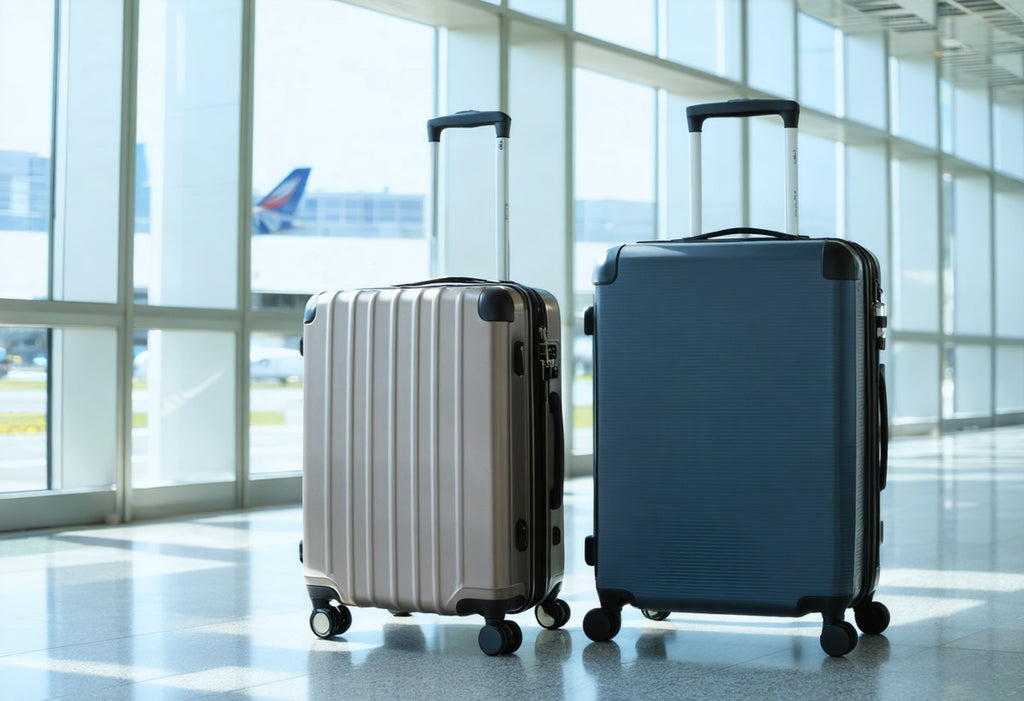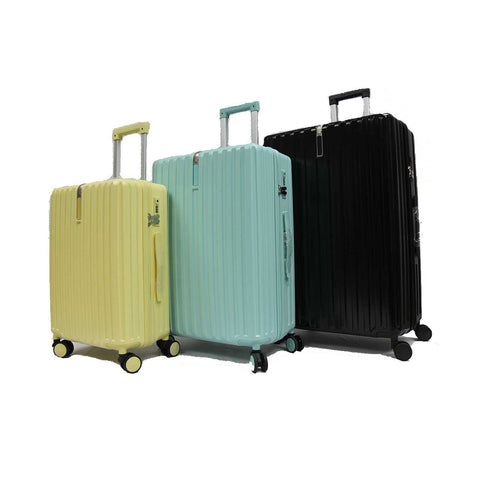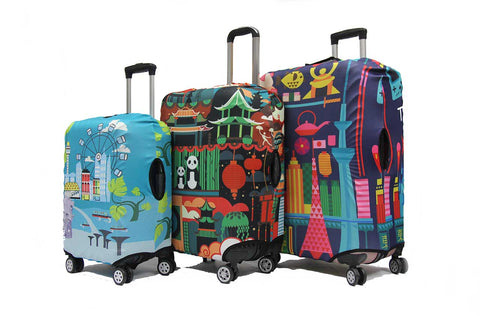Understanding Expandable Hardcase Luggage
When planning your next trip, the luggage you choose can significantly impact your travel experience. For budget-conscious travelers, maximizing space while maintaining durability is often a top priority. Expandable hardcase luggage has become increasingly popular among travelers who want the best of both worlds: the protection of a hard shell with the flexibility to accommodate those extra souvenirs or necessities.
Space-Saving Features
Expandable hardcase luggage combines the structural integrity of traditional hardside suitcases with innovative design elements that allow for additional packing space when needed. These suitcases typically feature a zippered expansion system that can increase the luggage's capacity by 15-25%, depending on the model.
The rigid exterior shell, usually made from materials like ABS (Acrylonitrile Butadiene Styrene), polycarbonate, or polypropylene, maintains its shape regardless of contents. This structural consistency allows for more strategic packing compared to softer alternatives that might bulge or deform when fully loaded.
Most expandable hardcase options include interior organizational features such as:
Compression straps to secure clothing and minimize shifting
Divider panels that create separate compartments
Mesh pockets for smaller items
Waterproof compartments for toiletries or wet items
Expansion Capabilities
The true magic of expandable hardcase luggage lies in its ability to transform when you need extra space. The expansion mechanism typically works through a circumferential zipper that, when unzipped, allows the case to extend outward by 1-2 inches.
This expansion capability proves particularly valuable in several scenarios:
When returning from vacation with souvenirs
For longer trips requiring more clothing options
When traveling between different climates necessitating bulkier items
During holiday seasons when you might be transporting gifts
The Hourglass ABS Anti-theft Expandable Luggage exemplifies this versatility with its expandable design that provides up to 25% additional packing space while maintaining the security benefits of a hardside case.
Weight Considerations
One common concern with hardcase luggage is weight. The rigid materials that provide protection also add heft to your luggage before you even begin packing. However, manufacturers have made significant advancements in lightweight materials to address this issue.
Modern expandable hardcase luggage often utilizes:
ABS plastic: Lightweight but less durable than other options
Polycarbonate: Offers an excellent balance of weight and durability
Polypropylene: Extremely lightweight with good impact resistance
When considering weight efficiency, remember that expandable hardcase luggage typically weighs:
Small carry-on sizes: 5-7 pounds
Medium sizes: 7-9 pounds
Large checked luggage: 9-12 pounds
This weight consideration becomes particularly important for budget travelers who want to avoid excess baggage fees while maximizing their packing capacity.
Softside Luggage Benefits
While expandable hardcase luggage offers substantial benefits, softside luggage presents its own set of advantages for the space-conscious traveler. Understanding these benefits helps determine which option might better suit your specific travel needs.
Flexibility Advantages
Softside luggage's primary advantage lies in its inherent flexibility. Constructed from materials like ballistic nylon, Cordura, or polyester, these bags can conform to tight spaces and compress when not fully packed.
This flexibility translates to several practical benefits:
Easier storage in overhead compartments on planes
Better fit in car trunks and other limited spaces
Ability to squeeze into tight hotel room storage areas
Compression to smaller dimensions when not fully packed
The malleability of softside luggage makes it particularly advantageous for travelers who frequently navigate crowded spaces or use various transportation methods during their journeys.
External Pockets
Perhaps the most significant space-saving advantage of softside luggage is the inclusion of external pockets and compartments. These accessible storage options allow travelers to:
Keep frequently needed items within easy reach
Separate documents, electronics, or toiletries from main contents
Maximize overall packing capacity by utilizing exterior space
Create organization systems that reduce the need to open the main compartment
Most softside luggage features multiple exterior pockets of varying sizes, from small zippered pouches for boarding passes to larger compartments that can hold books, tablets, or even a change of clothes.
Compression Options
Softside luggage often includes external compression straps that allow travelers to cinch down the bag's contents, reducing its overall size. This feature proves particularly useful when:
The bag isn't completely full
You need to meet specific airline size requirements
You're trying to fit the luggage into tight storage spaces
You want to prevent contents from shifting during transit
Additionally, the fabric construction of softside luggage naturally compresses under pressure, unlike rigid hardside cases that maintain their shape regardless of how full they are. This natural compression can be advantageous when trying to maximize space efficiency in cars, trains, or overhead compartments.
Space Efficiency Comparison
When deciding between expandable hardcase luggage and softside options, understanding how each performs in real-world packing scenarios can help you make the most informed decision for your travel needs and budget.
Packing Capacity Analysis
When comparing pure volume metrics, expandable hardcase luggage and softside options often have similar stated capacities. However, how that space functions in practice differs significantly:
Expandable Hardcase Luggage:
Offers consistent, predictable interior space
Provides structured packing environment
Expansion increases volume by approximately 15-25%
Interior space is limited to the confines of the rigid shell
Softside Luggage:
Features slightly more forgiving dimensions
Allows for some overpacking beyond stated capacity
Exterior pockets add significant functional capacity
Natural fabric flexibility accommodates oddly shaped items
For pure maximization of space, softside luggage typically allows you to pack more items overall due to its combination of exterior pockets and material flexibility. However, expandable hardcase luggage offers more protected space when expanded, which can be crucial for fragile items.
Real Travel Scenarios
Different travel situations may favor one luggage type over the other:
Weekend Getaways:
Softside advantages: External pockets for quick access to essentials, flexibility to fit in smaller spaces
Hardcase advantages: Protection for electronics, structured organization for limited items
International Travel:
Softside advantages: Compression options for varying airline requirements, adaptability for different transportation methods
Hardcase advantages: Security for valuables, expansion capability for souvenirs, weather resistance
Business Travel:
Softside advantages: Quick access to documents, professional appearance, adaptability to different storage options
Hardcase advantages: Protection for electronics and business attire, structured organization
Family Vacations:
Softside advantages: Multiple compartments for different family members' items, flexibility for oddly shaped children's toys
Hardcase advantages: Durability for rough handling, expansion for accumulated family purchases
Value for Money
Budget-conscious travelers must consider not just the initial purchase price but the overall value proposition of their luggage choice:
Expandable Hardcase Value Factors:
Generally higher initial cost ($80-$300+ depending on brand and size)
Longer lifespan due to rigid construction (typically 5-10 years with proper care)
Better protection for valuable contents
Potential savings on replacement costs due to durability
Softside Value Factors:
Often more affordable initial purchase ($50-$250 depending on brand and size)
Shorter average lifespan (3-7 years with regular use)
More functional space per dollar spent
Greater versatility across different travel scenarios
The Hourglass ABS Anti-theft Expandable Luggage represents an excellent value proposition for expandable hardcase options, offering security features like number locks alongside its space-saving expansion capability at a competitive price point.
Making the Right Choice for Your Travel Style
When deciding between expandable hardcase luggage and softside options, your personal travel habits should guide your decision. Both luggage types offer distinct space-saving advantages that appeal to different travel scenarios.
Who Benefits Most from Expandable Hardcase Luggage
Expandable hardcase luggage works best for travelers who:
Prioritize protection for fragile items or electronics
Travel in varied weather conditions
Want structured organization for their belongings
Appreciate the security of a more rigid exterior
Need the option of additional space for return trips
Value long-term durability over initial cost savings
The expandable feature addresses the primary limitation of traditional hardside luggage: fixed capacity. With the ability to increase volume when needed, these cases offer versatility without sacrificing protection.
Who Benefits Most from Softside Luggage
Softside luggage tends to be the preferred choice for travelers who:
Frequently need quick access to travel documents or essentials
Often navigate tight spaces like crowded public transportation
Regularly pack irregularly shaped items
Prioritize having the lightest possible luggage weight
Value maximum flexibility in packing configuration
Travel with varying amounts of belongings
The natural compression capabilities and exterior pockets make softside luggage inherently more adaptable to changing packing needs.
Hybrid Solutions and Alternatives
For those struggling to choose between the two options, consider:
Luggage sets that include both hardside and softside pieces
Hybrid luggage with hardside back and softside front
Supplementing your main luggage with packable duffel bags
Using packing cubes to maximize organization in either luggage type
Maximizing Space Regardless of Your Choice
Whichever luggage type you select, implementing smart packing strategies can help you make the most of available space:
Use packing cubes to compress clothing and maintain organization
Roll clothes instead of folding to reduce wrinkles and save space
Fill hollow items (shoes, hats) with smaller accessories or socks
Wear your bulkiest items during travel rather than packing them
Use vacuum compression bags for bulky items like jackets or sweaters
Plan outfits strategically to minimize the number of items needed
Final Verdict: Which Truly Saves More Space?
After analyzing both options thoroughly, the answer to which luggage type saves more space depends largely on how you define "space-saving":
If your definition centers on maximum protected capacity when needed, expandable hardcase luggage like the Hourglass ABS Anti-theft Expandable Luggage offers the best solution. Its expansion capability provides significant additional volume while maintaining structural integrity and protection.
If your definition focuses on overall packing flexibility and adaptability, softside luggage typically offers more functional space through its combination of exterior pockets, natural compression, and conforming shape.
For budget travelers, the decision often comes down to balancing immediate needs with long-term value. Expandable hardcase luggage generally represents a better long-term investment due to durability, while softside options might offer more immediate functionality per dollar spent.
Ultimately, the most space-efficient luggage is the one that best matches your specific travel patterns, packing habits, and protection requirements. By understanding the strengths and limitations of each option, you can make an informed choice that will serve your travel needs while respecting your budget constraints.
Remember that regardless of which type you choose, proper packing techniques and organization will always help you maximize available space and enhance your overall travel experience.



